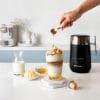https://www.instagram.com/p/B55lNkPgpll/
Tell us more about the idea and beginning of Drunk Elephant.
When I started Drunk Elephant, my vision was to help people with their skin concerns and build a company off of my philosophy of not only using the highest quality biocompatible ingredients, but also avoiding every sensitizing, disruptive, congestive, stripping and irritating ingredient I could. Six of the ingredients I’m talking about were present in some combination in almost every skincare product on the market, as far as I could tell. Back then, talking about biocompatibility, the acid mantle, clean beauty and pH levels wasn’t a thing. I based Drunk Elephant on what I wanted to use myself as a consumer.
What was your first formulation and product, and why did you think it was necessary to create it?
I launched Drunk Elephant with 6 products: Juju, Pekee, Umbra, C-Firma, TLC Framboos and Marula. It was important to me to launch with a full collection so that people could fully implement the philosophy. A routine is only as good as its worst ingredient.
You started off the business because you wanted your children to not be exposed to toxic ingredients in skincare products. What was your first discovery of these harmful ingredients that led you to start Drunk Elephant?
As a mom, I’ve always wanted to give my kids the best of everything, but I actually didn’t have the idea to start Drunk Elephant until 2012 when my kids were already in school. My friends and family members would come to me and ask me for my advice on what vitamin C to use, what was the best moisturizer out there. I’ve always loved to help people, and I found that I also loved doing research on ingredients and products. I couldn’t find products that I thought were just right…they always contained one or two things I wished weren’t there. It wasn’t that all of the ingredients that I wanted to stay away from were toxic; some were perfectly safe. I thought that every ingredient should also be biocompatible, meaning the skin can absorb, recognize, use, and benefit it from without sensitization, congestion, or confusion. I also saw no use for unnecessary marketing ingredients like silicones, fragrances and dyes that are only there to make the product feel, smell or look better but have no benefit to the skin, and could potentially cause irritation. It seemed like a good idea to just make a line myself that lived up to my standards and criteria. Drunk Elephant was officially launched on August 15, 2013. So, it took around 2 years. That’s not a long time when you consider I started with 6 products and I had to develop, test, package and create the marketing.
https://www.instagram.com/p/B99oq08nfTu/
The elimination of the ‘Suspicious 6’ is a discovery very much linked to Drunk Elephant and its formulations.
Tell us more about these ingredients and its effects to the skin.
Essential Oils – By their nature, their volatile fragrance compounds are sensitizing to skin. There is no benefit to them that can’t be replicated by other non-fragrant ingredients that do not share their downsides.
Drying Alcohols – These are the alcohols that have the potential to dehydrate and sensitize—and are identified by the names SD alcohol, denatured alcohol, alcohol denat, natural alcohol, grain alcohol, ethyl alcohol or just plain *alcohol* on an ingredient list. We believe they cause long-term damage to skin. While these help actives penetrate into skin more easily, they do so by dissolving the lipids that help keep skin pliant and moisturized. This results in inflammation in skin, which in turn can provoke breakouts.
Silicones – They can congest skin, especially with heavier weight occlusive silicones (dimethicone), and they prevent actives (like ascorbic acid) from penetrating into skin and doing their job. Some may also dehydrate skin.
Chemical Screens – Many find these types of sunscreen actives to be sensitizing, especially when used around the eye area or by those with skin sensitivities and disorders (like rosacea or eczema). We believe that they also, through sensitization, can lead to random breakouts and worsening of acne. They can be great, but for some, they can be problematic so we use physical screens instead.
Fragrance/Dyes – Designed to add a pretty color or scent to a formula, these have literally no benefit to skin, but can be sensitizing and take up space from ingredients that are actually good for skin.
SLS – A surfactant that is a little too good at its job. Not only can it be very harsh in terms of stripping moisture, it is a small molecule that penetrates into skin, causing inflammation, and potentially damaging the skin barrier.
Clean Beauty has become a category in its own league in the past few years. What are some of the misconceptions of the clean beauty category that Drunk Elephant has addressed over the years?
I’m not sure if we are addressing misconceptions about the clean beauty category as a whole, it’s more that we are trying to be as clear and transparent as possible in our own messaging. We’re actually moving away from the term “clean”, because “clean” has come to a meaning that’s only one part of my philosophy, and it’s still not really representative of what Drunk Elephant is about.
The term “clean” in the industry has evolved into something very different than what I meant when describing Drunk Elephant. “Clean” today, if you look at how brands and retailers are using the term, simply means their own definition of safe. But brands are still leaving in things like essential oils and silicones that can and do lead to skin issues due to their potential to provoke inflammation in skin. In my opinion, this is why being “clean” is not enough and it isn’t a helpful term for the consumer, because it can mean virtually anything the brand wants it to mean. “Clean” is also often used as a coded term for “natural,” but natural doesn’t mean safe or even good for skin—there are plenty of examples of naturally-derived substances that are bad for you (lead, snake venom, mold and poison ivy are 100% natural).
We’re now calling our category ”Biocompatible”, meaning not harmful to living tissue, including the skin itself. I think biocompatible represents more clearly how Drunk Elephant is different. It’s not about natural or synthetic, only what is beneficial for skin. This category is unique to our brand, no other brands that I’m aware of are implementing it, and as a category, it avoids the most problematic ingredients in skin care today.
Biocompatible means that once the Suspicious 6 are removed from the routine, the skin can function like normal and thrive and this is even true for many that have suffered for decades with issues they just believed were owed to their skin type. In summary, yes, my brand is “clean”, as in there are no ingredients that can enter into the bloodstream and cause harm. What makes Drunk Elephant different though is that these ingredients also respect and support the healthy function of skin when they are applied externally. My mission is to help people by delivering products that work and can improve the quality of their skin when the philosophy is strictly adhered to. Think WHOLE30 for the skin!
It’s been 8 years since Drunk Elephant started. What have you learned about the process of creating a business from scratch?
I’ve learned so many lessons since Drunk Elephant launched and still do – one a day at least! Probably the biggest though is to stay in your own lane and don’t let others try to talk you out of your vision. Everyone has an opinion and that’s fine, but you need to stick with your strategy and listen to your gut…just because something hasn’t been done before doesn’t mean that it can’t be done!
https://www.instagram.com/p/B92VzozBxVh/
The brand’s loyal fans have contributed greatly to the exponential growth since its start in 2012. How has Drunk Elephant continued to engage its customers in the process of new development and products?
Our fans are like a huge focus group. They are loud and interactive and we are always listening and responding as quickly as we possibly can. I love our vocal fans and I always learn from them. It’s important to really pay attention to their feedback, and if and when a change makes sense, we will always try to make it. To me, a key part of our success is staying in tune with my own wants and needs as a consumer and listening closely to feedback from the community.
Shop Drunk Elephant’s skincare range and newly released body care range at Sephora stores nationwide and online.



